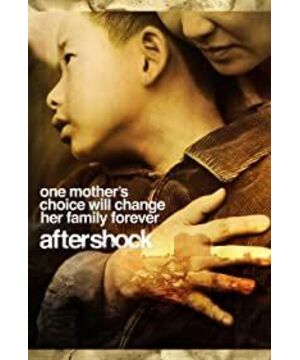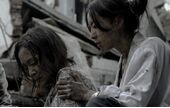So I watched "Assembly" on a winter day a few years ago and it was very moving. It is very gratifying to think that there is a fifth-generation director who sincerely makes his own films when the old people lose themselves.
This time, I was fortunate to sit in a special session of "Tangshan Earthquake" and have a sneak peek.
I heard the first colleague who watched it say that this movie is not a question of whether to cry or not, but a question of how many times you cry. In fact, it should have been expected long ago - back then, a few news pictures on TV accompanied by a slideshow of string music could make people cry, not to mention the artistic presentation that has endured these two catastrophes in more than two hours. It is said that this film has been screened twice in Hong Kong before, and there were tears in the nose and tears at the scene. Some reporters even sobbed while asking questions at the subsequent press conference. But the film bureau revealed that the most awesome audience actually started to cry when they saw the dragonfly at the beginning... This is still a bit too powerful.
In good conscience, Feng Xiaogang has been very restrained. This kind of story is too easy to be promiscuous and out of control. Although there are inevitably some contrived parts, but after two hours, I didn't feel that he was like Chen Kaige, wishing to keep his central idea in the corner of the screen. Whether you're crying in a frenzy or calm down, that's a personal matter.
Although it is not directly involved in politics like "The Founding of the People's Republic of China", it is foreseeable that there will be many mixed evaluations after the release of this subject that is so realistic that it is difficult to separate. I just feel that under the attention, pressure and intervention of all parties, Feng Xiaogang handed in a pretty good answer.
Let's talk about actors first. What is commendable is that in today's star-studded era, this film has selected a group of excellent actors who are powerful but very controlling. Xu Fan, Zhang Jingchu, Chen Daoming, Chen Jin, Yang Lixin... From the main to the supporting role, everyone's performances are delicate and tense, but they all retreat into the story, and there is no suspicion of being overwhelmed by the host, and they are not incurred by their first appearance. The audience was in an uproar. I especially like the episode of Yang Lixin and Xu Fan's dinner, as well as several rival scenes between Chen Daoming and Chen Jin - these episodes are not directly related to the earthquake, but they are interspersed very naturally, for the humanity that the film wants to show. The theme adds a few finishing touches, which makes the audience who temporarily put aside their grief moved without warning and has a long aftertaste.
This has to mention Lu Yi. When he first appeared in medical school, the close-up of his face like a shampoo advertisement made the audience's high spirits shriveled all of a sudden. The friend next to me was already full of rosy eyes, but he couldn't help but say, "This is so handsome, it's too discordant!" In fact, this is not only the actor's problem, but also the responsibility of editing, photography, and art direction. However, in the role of Fang Deng, Zhang Jingchu is really expressive and beautiful.
The script is also good. Since we want to discuss great love and family affection, we should always tap and not stay in the cold. Every few minutes, I will hear a word that directly points to the heart, and see the details of the lingering sound. What impressed me the most were the two words Chen Jin said to her daughter on the hospital bed: "The two of you are the two of you who I love the most in my life, but neither of you want to be with me." The daughter is at the top right of the picture beside the hospital bed. , the husband is the lower left close-up of the camera outside the ward. At that moment, the helplessness of life and feelings was exhausted. Helplessness is love, but it cannot be approached; it is life, but there is no intimacy after death.
There is also a series of words and deeds of the mother played by Xu Fan. When her son made a lot of money in Hangzhou and wanted to buy her a new house in Tangshan, she looked at the house, changed her mind temporarily, and muttered to herself: "If you move to a new house, you will have to tell your father and your sister. The last time you moved , I’ve been talking about it for 20 years. Now that I’m old, I can’t talk anymore.” Then she recalled the previous time, slowly burning paper and meticulously telling her deceased relatives that the original home was going to be a department store, and a new one was going to be built. What road should the family follow, and which intersection should they turn left, for fear that their souls will not find their way home when they come back.
"Now that I'm old, I can't talk anymore." What our main theme film lacks is such a natural and profound self-talk.
The mother's clinging to Tangshan's home is a main line of the whole film. When her son persuaded her to find another wife, she suddenly said excitedly: "Which man can treat me better than your father? He took his own life to treat me well!" Then she returned to calm and firmness "Don't talk about this again." The daughter-in-law stared at her for a long time with a completely shocked dull look.
The theme is to be fully expressed in the protagonist, but I am equally sensitive to the peripheral parts of the panorama woven by the supporting characters. At this point, the script based on the novel is particularly full. Before the Chinese New Year, the daughter-in-law had a big quarrel with her son and insisted on taking her grandson away to celebrate the New Year with her parents. The son took pity on the mother, knowing that this grandson was the mother's only sustenance for the Chinese New Year, and arrogantly refused. The two then fought each other. But everything was on camera. The daughter-in-law got dressed, walked to the outhouse, kissed the child, and even kindly said to the mother, "It's exhausting to let you take care of the child by yourself during the Chinese New Year," and then she held back her tears and left with her son. .
It is worth mentioning that Feng Xiaogang used various visual and auditory symbols to express the imprints and changes of the times, quite in the style of Jia Zhangke. In addition to the short-lived ICBC passbooks, instant noodles, and revolutionary songs, the Jiannanchun wine bottles that appeared several times are even more intriguing.
At the end, Feng Xiaogang wisely jumped out of this fictitious story of great joy and great sorrow, focusing on an old man who had personally experienced the catastrophe. The camera pans calmly to the end, following the slow rhythm of his bicycle ride past the earthquake monument.
Looking back on the story, I found that "stubbornness" is a common feature of many of the characters. This word is very interesting. It describes a character on the surface, but in fact, it is an absolutely subjective judgment of an outsider on an insider. Many times, it means that others do not understand, and means stupidity in a sense. However, in the causes and consequences of natural and man-made disasters, "stubbornness" has become synonymous with strong and profound emotions.
A few more flaws. It is said that there is also a 3-hour director's cut version, but the officially released version was required to be cut to two hours, so there are a lot of scenes of Zhang Jingchu and her daughter missing. Presumably because of this, the editing of the film has the common problems of other released films, and some places are quite abrupt, and even when the strings are still ringing, it is abruptly interrupted by revolutionary songs...
And the soundtrack. The story itself is already very emotional. I didn't expect that the soundtrack was still powerful, and it could be used as the main theme of the song. Sometimes it was very distracting, and sometimes it was ruthless. It was not a simple story like "My Father and Mother". Why bother? It's time for our soundtrack to learn the forbearance and subtlety of Western intellectuals. When can you make a dream like Alexander Desplate, but when you can't hum it, you will be invincible.
In addition, the English subtitles of the film are translated well, but they completely ignore the text that appears on the screen and the lyrics of the background song. Chinese people understand it, but you must know that if there is no translation, these details that contribute to the creation of the story environment will completely lose any information value to foreign audiences.
(No notes were taken while watching the film, and the dialogue and individual details involved in the text may be inaccurate.)
View more about Aftershock reviews









